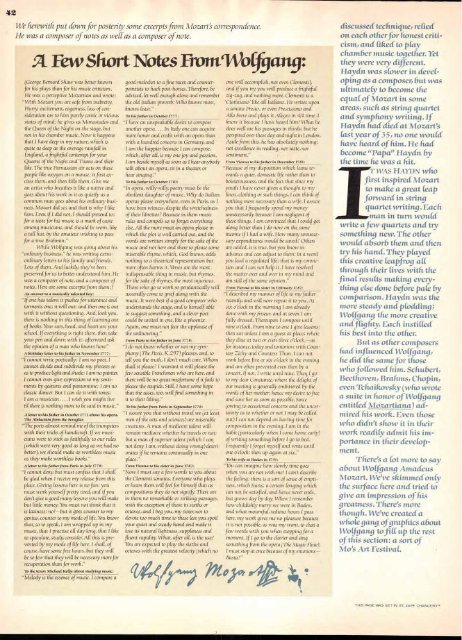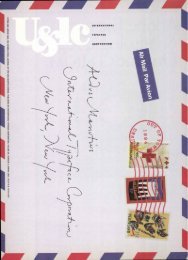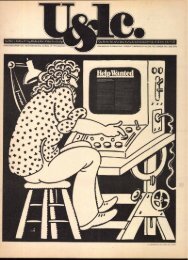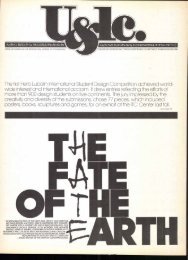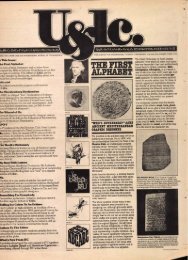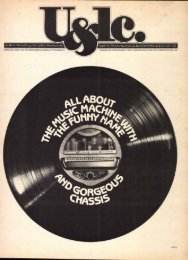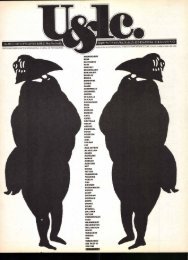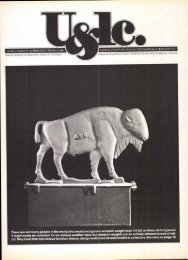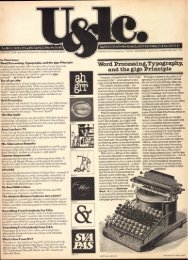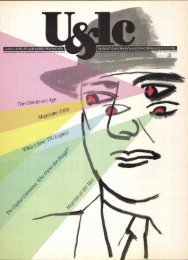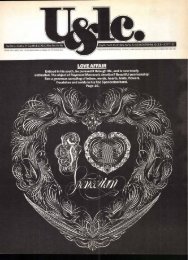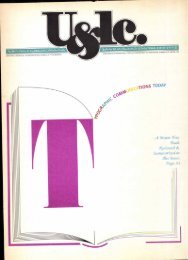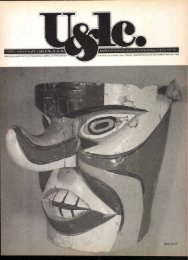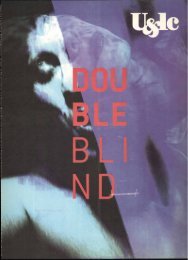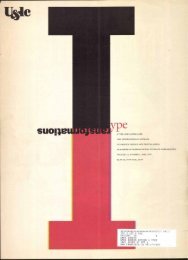Volume 9–2 (Low Res).pdf
Volume 9–2 (Low Res).pdf
Volume 9–2 (Low Res).pdf
Create successful ePaper yourself
Turn your PDF publications into a flip-book with our unique Google optimized e-Paper software.
42<br />
We herewith put down for posterity some excerpts from Mozart's correspondence.<br />
He was a composer of notes as weir as a composer of note.<br />
A Few Short Notes FromWoy:gang:<br />
(George Bernard Shaw was better known<br />
for his plays than for his music criticism.<br />
He was a perceptive Mozart-ion and wrote:<br />
"With Mozart you are safe from inebreity.<br />
Hurry, excitement, eagerness, foss of con-<br />
sideration are to him purely comic or vicious<br />
states of mind: he gives us Monostados and<br />
the Queen of the Night on the stage, but<br />
not in his chamber music .Ncnv it happens<br />
that I have deep in my nature, which is<br />
quite as deep as the average rainfall in<br />
England, a frightful contempt for your<br />
Queens of the Night and Titans and their<br />
like. The true Parnassian air acts on these<br />
people like oxygen on a mouse: it first excites<br />
them, and then kills them. Give me<br />
art artist who breathes it like a native and<br />
goes about his work in it as quietly as a<br />
common man goes about his ordinary business.<br />
Mozart did so; and that is why I like<br />
him. Even if I did not, I should pretend to;<br />
for a taste for his music is a mark of caste<br />
among musicians, and should be worn, like<br />
a tall hat, by the amateur wishing to pass<br />
for a true Brahmin."<br />
While Wolfgang was going about his<br />
"ordinary business," he was writing extraordinary<br />
letters to his family and friends.<br />
Lots of them. And luckily, they've been<br />
preserved for us to better understand him. He<br />
was a composer of note, and a composer of<br />
notes. Here are some excerpts from them:)<br />
An answer to a musically talented boy:<br />
"If one has talent it pushes for utterance and<br />
torments one; it will out; and then one is out<br />
with it without questioning. And, Cook you,<br />
there is nothing in this thing of learning out<br />
of books. Your ears, head, and heart are your<br />
school. If everything is right there, then take<br />
your pen and down with it; afterward ask<br />
the opinion of a man who knows how."<br />
A birthday fetter to his father in November 1777:<br />
"I cannot write poetically; I am no poet. I<br />
cannot divide and subdivide my phrases so<br />
as to produce light and shade; I am no painter.<br />
I cannot even give expression to my sentiments<br />
by gestures and pantomime; I am no<br />
classic dancer. But I can do it with tones;<br />
I am a musician.... I wish you might five<br />
tin there is nothing more to be said in music."<br />
A fetter to his father in October 1771 about his opera,<br />
The Abduction from the Seraglio:<br />
"The poets almost remind me of the trumpeters<br />
with their tricks of handicraft. If we musicians<br />
were to stick as faithfully to our rules<br />
(which were very good as Fong as we had no<br />
better), we should make as worthless music<br />
as they make worthless books."<br />
A fetter to hisfatherfrom Paris in Jufy 1778:<br />
"I cannot deny, but must confess that I shall<br />
be glad when I receive my release from this<br />
place. Giving lessons here is no fun; you<br />
must work yourself pretty tired, and if you<br />
don't give a good many lessons you will make<br />
but little money. You must not think that it<br />
is laziness; no! — but it goes counter to my<br />
genius, counter to my mode of fife. You know<br />
that, so to speak, I am wrapped up in my<br />
music, that I practise all day tong, that I Pike<br />
to speculate, study, consider. Aff this is prevented<br />
by my mode of fife here. I shall,<br />
course, have some free hours, but they will<br />
be so few that they will be necessary more for<br />
recuperation than for work."<br />
To the tenor, Michael Kelly, about studying music:<br />
"Melody is the essence of music. I compare a<br />
good melodist to a fine racer, and counterpointists<br />
to hack post-horses. Therefore, be<br />
advised, let well enough alone and remember<br />
the old Italian proverb: Who knows most,<br />
knows feast."<br />
To his father in October 1777:<br />
"I have an unspeakable desire to compose<br />
another opera.... In Italy one can acquire<br />
more honor and credit with an opera than<br />
with a hundred concerts in Germany, and<br />
I am the happier because I can compose,<br />
which, after all, is my one joy and passion.<br />
I am beside myself as soon as I hear anybody<br />
talk about an opera, sit in a theater, or<br />
hear singing."<br />
To his father in October 1781:<br />
"In opera, witty-niffy, poetry must be the<br />
obedient daughter of music. Why do Italian<br />
operas please everywhere, even in Paris, as I<br />
have been witness, despite the wretchedness<br />
of their librettos? Because in them music<br />
rules and compels us to forget everything<br />
else. All the more must an opera please in<br />
which the plot is well carried out, and the<br />
words are written simply for the sake of the<br />
music and not here and there to please some<br />
miserable rhyme, which, God knows, adds<br />
nothing to a theatrical representation but<br />
more often harms it. Verses are the most<br />
indispensable thing in music, but rhymes,<br />
for the sake of rhymes, the most injurious.<br />
Those who go to work so pendantically will<br />
assuredly come to grief along with the<br />
music. It were best if a good composer who<br />
understands the stage, and is himself able<br />
to suggest something, and a clever poet<br />
could be united in one, like a phoenix.<br />
Again, one must not fear the applause of<br />
the unknowing."<br />
From Paris to hisfather in June 1778:<br />
"I do not know whether or not my symphony<br />
(The Paris, K.297) pleases, and, to<br />
tell you the truth, I don't much care. Whom<br />
shall it ()Lease? I warrant it will please the<br />
few sensible Frenchmen who are here, and<br />
there will be no great misfortune if it fails to<br />
please the stupids. Stiff, I have some hope<br />
that the asses, too, wilt find something in<br />
it to their liking."<br />
hisfatherfrom Paris in September 1778:<br />
"I assure you that without travel we (at feast<br />
men of the arts and sciences) are miserable<br />
creatures. A man of mediocre talent will<br />
remain mediocre whether he travels or not;<br />
but a man of superior talent (which I can<br />
not deny I am, without doing wrong) deteriorates<br />
if he remains continually in one<br />
place."<br />
From Vienna to his sister in June 1783:<br />
"Now I must say a few words to you about<br />
the (Amend sonatas. Everyone who plays<br />
or hears them wifffeeffor himself that as<br />
compositions they do not signify. There are<br />
in them no remarkable or striking passages,<br />
with the exception of those in sixths or<br />
octaves, and I beg you, my sister, not to<br />
devote too much time to these lest you spoil<br />
your quiet and steady hand and make it<br />
lose its natural lightness, suppleness and<br />
fluent rapidity. What, after aft, is the use?<br />
You are expected to play the sixths and<br />
octaves with the greatest velocity (which no<br />
one will accomplish, not even Clementi),<br />
and if you try, you will produce a frightful<br />
zig-zag, and nothing more. Clementi is a<br />
'Ciarfatano' like aff Italians. He writes upon<br />
a sonata Presto, or even Prestissano and<br />
Alfa breve and plays it Allegro in 4/4 time. I<br />
know it because I have heard him! What he<br />
does well are his passages in thirds; but he<br />
perspired over these day andnight in London.<br />
Aside from this, he has absolutely nothing;<br />
not excellence in reading, nor taste, nor<br />
sentiment."<br />
From Vienna to his father in December 1781:<br />
"Because of my disposition which leans towards<br />
a quiet, domestic fife rather than to<br />
boisterousness, and the fact that since my<br />
youth I have never given a thought to my<br />
clothing or such things, I can think of<br />
nothing more necessary than a wife. I assure<br />
you that I frequently spend my money<br />
unnecessarily because I am negligent of<br />
these things. I am convinced - that I could get<br />
along better than I do now on the same<br />
income if I had a wife. How many unnecessary<br />
expenditures would be saved? Others<br />
are added, it is true, but you know in<br />
advance and can adjust to them; in a word<br />
you lead a regulated fife; that is my conviction<br />
and I can not help it. I have resolved -<br />
the matter over and over in my mind and<br />
am stiff of the same opinion."<br />
From Vienna to his sister in February 1782:<br />
"I described my manner of fife to my father<br />
recently, and will now repeat it to you. At<br />
six o'clock in the morning I am already<br />
done with my friseur and at seven I am<br />
fully dressed. Thereupon I compose until<br />
nine o'clock. From nine to one I give lessons;<br />
then eat unless I am a guest at places where<br />
they dine at two or even three o'clock , — as<br />
for instance, today andtomorrow with Countess<br />
achy and Countess Thun. I can not<br />
work before five or six o'clock in the evening<br />
and am often prevented even then by<br />
concert. If not, I write until nine. Then . I go<br />
to my dear C onstanze, where the delight of<br />
our meeting is generally embittered by the<br />
words of her mother; hence my desire to free<br />
and save her as soon as possible. Since<br />
(owing to occasional concerts and the uncertainty<br />
as to whether or not I may be called<br />
out) I can not depend on having time for<br />
composition in the evening, I am in the<br />
habit (particularly when I come home early)<br />
of writing something before I go to bed.<br />
Frequently I forget myself and write until<br />
one o'clock; then up again at six"<br />
To his wife at Batten in 1791:<br />
"You can imagine how slowly time goes<br />
when you are not with me! I can't describe<br />
the feeling; there is a sort of sense of emptiness,<br />
which hurts; a certain tonging which<br />
can not be satisfied, and hence never ends,<br />
but grows day , by day. When I remember<br />
how childishly merry we were in Baden,<br />
and what mournful, tedious hours I pass<br />
here, my work gives me no pleasure because<br />
it is not possible, as was my wont, to chat a<br />
few words with you when stopping for a<br />
moment. If I go to the clavier and sing<br />
something from the opera (The Magic Flute),<br />
I must stop at once because of my emotions —<br />
Basta!"<br />
discussed technique, relied<br />
on each other for honest criticism,<br />
and lifted to play<br />
chamber music together. Yet<br />
they were very different.<br />
Haydn was slower in developing<br />
as a composer, but was<br />
ultimately to become the<br />
equal of Mozart in some<br />
areas, such as string quartet<br />
and symphony writing. If<br />
Haydn had died at Mozart's<br />
last year of 35, no one would<br />
have heard of him. He had<br />
become "Papa" Haydn by<br />
the time he was a hit.<br />
T WAS HAYDN who<br />
first inspired Mozart<br />
to make a great leap<br />
forward in string<br />
quartet writing. Each<br />
man in turn would<br />
write afew quartets and try<br />
something new. The other<br />
would absorb them and then<br />
try his hand. They played<br />
this creative leapfrog all<br />
through their lives with the<br />
final results making everything<br />
else done before pale by<br />
comparison. Haydn was the<br />
more steady and p sodding;<br />
Wolfgang the more creative<br />
andffig fay. Each instilled<br />
his best into the other.<br />
But as other composers<br />
had influenced WoVgang,<br />
he did the same for those<br />
who followed him. Schubert,<br />
Beethoven, Brahms, Chopin,<br />
even Tchaikovsky (who wrote<br />
a suite in honor of Wo(gang<br />
entitled Mozartiana) admired<br />
his work. Even those<br />
who didn't show it in their<br />
work readily admit his importance<br />
in their development.<br />
There's a lot more to say<br />
about Wo4-gang Amadeus<br />
Mozart. We've skimmed only<br />
the surface here and tried to<br />
give an impression of his<br />
greatness. There's more<br />
though. We've created a<br />
whole gang of graphics about<br />
WoYgang to fill up the rest<br />
of this section: a sort of<br />
Mo's Art Festival.<br />
THIS PAGE WAS SET IN ITC ZAPF CHANCERYT.


